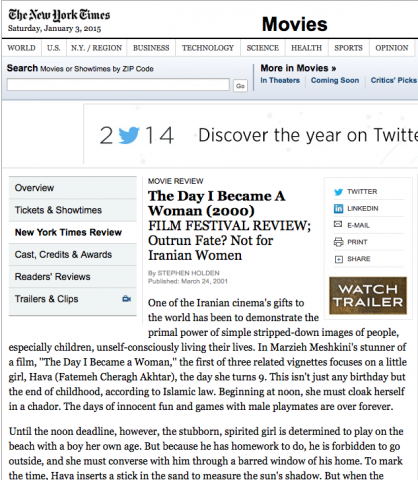
The New York Times
March 24, 2001
By STEPHEN HOLDEN
The Day I Became A Woman (2000)
FILM FESTIVAL REVIEW; Outrun Fate? Not for Iranian Women
One of the Iranian cinema's gifts to the world has been to demonstrate the primal power of simple stripped-down images of people, especially children, unself-consciously living their lives. In Marzieh Meshkini's stunner of a film, ''The Day I Became a Woman,'' the first of three related vignettes focuses on a little girl, Hava (Fatemeh Cheragh Akhtar), the day she turns 9. This isn't just any birthday but the end of childhood, according to Islamic law. Beginning at noon, she must cloak herself in a chador. The days of innocent fun and games with male playmates are over forever.
Until the noon deadline, however, the stubborn, spirited girl is determined to play on the beach with a boy her own age. But because he has homework to do, he is forbidden to go outside, and she must converse with him through a barred window of his home. To mark the time, Hava inserts a stick in the sand to measure the sun's shadow. But when the appointed moment arrives, her mother (Shahrbanou Sisizadeh) and severe grandmother (Ameneh Pasand) appear carrying the chador that symbolizes her transition into young womanhood.
You don't have to be Islamic to be stirred by the force of the vignette, which might remind you of the first day of school or a dreaded childhood trip to the doctor. Childhood innocence, the passage of time, the authority and mystery of adults and how inescapable social forces bear down on our lives: all this and more are evoked with a deep, understated poignancy.
The key word is ''inescapable.'' The movie's three vignettes are all meditations on the near-impossibility of escaping the assigned female role in a fundamentalist Muslim state. Each story contemplates a woman at a different age. Ahoo (Shabnam Toloui), the protagonist of the second episode, is a desperately unhappy young wife who tries literally to outrun her fate in a women's bicycle race by the seashore. Pursued on horseback by her husband and fellow tribesmen, who urge her to reconsider and then threaten her with expulsion from the community, she is eventually surrounded by men who prevent her from progressing any further.
In the third episode, an old, presumably widowed woman (Azizeh Seddighi) who has come into a large inheritance journeys into the city where she methodically purchases a household full of appliances and luxury items. A group of local boys help her cart everything to the seaside in preparation for transport by boat to an unspecified destination. When she goes back to the city to exchange an item, the movie slips into a comic Felliniesque surrealism as the boys raid the refrigerator, turn on the appliances (although there are no electrical outlets in sight) and innocently partake of luxuries they may never taste again.
''The Day I Became a Woman,'' which New Directors/New Films is showing this evening at 6 and tomorrow at 3 p.m. at the Museum of Modern Art (it opens commercially next month), is an astonishing directorial debut because it doesn't include a single loose end or extraneous image. What appears on the screen has a starkness that is almost indelible. With a screenplay by Ms. Meshkini's husband, the director Mohsen Makhmalbaf (''Gabbeh,'' ''The Peddler''), the movie is enigmatic in the way of many Iranian films for leaving characters' backgrounds and motives unexplored. But its indifference to the tyrannical psychological realism that determines the shape and content of most Western films feels liberating.
All you need to know about Ahoo is etched in her expression of stricken determination. The bicycle race itself, which features about two dozen other women -- all in chadors -- speeding along a seaside road, assumes a metaphorical weight. For as fast and as far as they may travel, the movie suggests, there is nowhere to go. They are bounded by the sea, and they know it.
For all its feminist overtones, ''The Day I Became a Woman'' doesn't play like a fable of female oppression. Most of Ahoo's fellow riders exude a spirit of hardy enjoyment. And when Ahoo is finally rounded up (whether or not she surrenders is left somewhat in doubt), there is the sense that despite her apparent anguish, the whole chase is something of a game.
The final, phantasmagoric segment wonders what a woman who gains a measure of independence by Western standards, is finally winning. If you take a house full of consumer items and silhouette them against the sea and the sky, nature wins every time.
---------
THE DAY I BECAME A WOMAN
Directed by Marziyeh Meshkini; written (in Farsi, with English subtitles) by Mohsen Makhmalbaf; directors of photography, Ebrahim Ghafoori and Mohammad Ahmadi; edited by Shahrzad Poya and Maysam Makhmalbaf; music by Mohammad Reza Darvishi; production designer, Akbar Meshkini; produced by Makhmalbaf Film House; released by the Shooting Gallery. Running time: 78 minutes. This film is not rated. Shown tonight at 6 and Sunday at 3 p.m. at the Roy and Niuta Titus Theater, Museum of Modern Art, 11 West 53rd Street, Manhattan, as part of the 30th New Directors/New Films series of the Film Society of Lincoln Center and the department of film of the Museum of Modern Art.
WITH: Fatemeh Cheragh Akhtar (Girl), Hassan Nabehan (Boy), Shahrbanou Sisizadeh (Mother), Ameneh Pasand (Grandmother), Shabnam Toloui (Woman), Cyrus Kahouri Nejad (Husband), Mahram Zeinal Zadeh (Osman), Nourieh Mahiguirian (Rival Cyclist), Azizeh Seddighi (Old Woman) and Badr Irouni Nejad (Young Boy).

